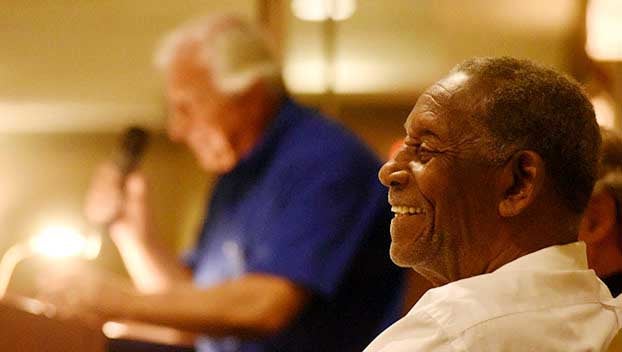Locals recall Charles Evers as civil rights icon
Published 5:29 pm Wednesday, July 22, 2020

- Former Fayette mayor Charles Evers, right, shares a laugh with former Natchez mayor Tony Byrne. Evers died Wednesday. (File photo, The Natchez Democrat)
|
Getting your Trinity Audio player ready...
|
Tony Byrne said Charles Evers never got the credit he deserved.
Evers, brother of Mississippi slain civil rights leader Medgar Evers, died Wednesday at the home of his daughter in Rankin County. Evers was 97.
“I don’t think he gets the credit he deserves as a civil rights icon. Charles kept the lid on Mississippi during that time, certainly kept the lid on southwest Mississippi,” Byrne said. “Frankly, I’m surprised no one killed him. That was the time when E.L. McDaniel — they called him Eddie — was the grand dragon of the Klan in Natchez. In later years, Charles Evers had him (McDaniel) up on a stage singing, ‘We Shall Overcome.’ That’s how good Charles was.”
Byrne said he last talked to Evers about three months ago on the phone. “I could tell then his voice was fading,” he said.
“He was a great friend of mine,” said Byrne, former long-time mayor of Natchez. “For the last 20 years — maybe more than that, I always called him on his birthday, which was Sept. 11.”
Evers returned to Mississippi from Chicago after his brother, Medgar, was killed in 1963. Like his late brother, he went to work as an NAACP field secretary. Later, he was elected mayor of Fayette, the first Black mayor in Mississippi since reconstruction, an office he held for 16 years.
Byrne and Evers worked together during the midst of the civil rights movement in Mississippi.
Byrne said Evers worked to “keep things calm” while trying to get the reforms the people he represented deserved.
“He led people in the right direction. Charles and I worked together integrating Blacks into the community in leadership positions. When he became mayor of Fayette, I asked the Mississippi Municipal Association — now the Mississippi Municipal League — to put him on the executive board. I would go through Fayette and pick him up and take him to the meetings in Jackson with me,” Byrne said.
A Democrat at the time, Evers was campaigning with Bobby Kennedy and was with him when he was killed.
Evers later became a Republican and in an interview in Natchez in 2017 said he was a Republican and a Trump supporter because he was a businessman.
“When he came here, the NAACP did not want him to be a field secretary. In fact, they didn’t want him at all, but he came and did it anyway. Charles was able to lead people, maybe because of his background in Chicago. He had a way of dealing with black people and white people. He always told me the truth. Everything he said he was going to do, he did. That’s how we worked together,” Byrne said.
Current Natchez Mayor Darryl Grennell, whose paternal grandparents owned a Gulf gas station at the corner of Woodlawn and Pine streets in Natchez — Pine is known as Martin Luther King Jr. Street today — said he met Evers when he was a child.
“I remember as a kid, Evers would come by my grandparents’ gas station and I felt honored to be in his presence. He was a civil rights legend, even then, not only in Fayette and Jefferson County but also in Natchez and Adams County,” Grennell said.
Evers and Grennell’s father, Jonathan Grennell, were arrested during the Parchman ordeal in Natchez in 1965. A group of approximately 800 young people marched in Natchez to protest segregation and discrimination of Blacks. Approximately 150 of those young men and women were arrested on charges of parading without a permit. Some were taken to the Mississippi State Penitentiary at Parchman and held for days under deplorable conditions.
“Charles Evers was in the forefront of the civil rights movement in Mississippi and Natchez — getting people registered to vote and getting businesses desegregated,” he said. “When I was in high school, it was a big deal in my book that I knew a black man who was mayor of a city.”
Grennell and his family would get to know Evers better when he put on annual events in Fayette to honor his late brother, Medgar.
“He would invite us to his home and I got to know him a little better when I was more mature. He also owned a radio station near the campus of Tougaloo, where I was an undergraduate student. My sister was a DJ at that station. In much later years, when I became a county supervisor, he ran for Jefferson County board of supervisors and won, so we got a chance to communicate and work together then,” he said. “Evers had a major impact on civil rights in the entire state. Even the country.”






